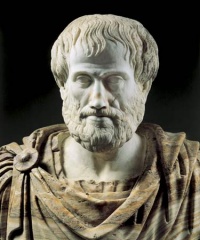Difference between revisions of "Aristotle"
From QueerBio.com
(Created page with "Aristotle ==Country== Greece ==Birth - Death== 384 - 322 BC ==Occupation== Academic ==Description== Greek philosopher and scien...") |
|||
| Line 16: | Line 16: | ||
Greek philosopher and scientist. Prolific author on numerous subjects, including biology, poetry, physics, astrology, politics, zoology, ethics, logic and more. Teacher to [[Alexander the Great]], and himself a student of [[Plato]]. Founded his own school, the Lyceum, in Athens. His process of reasoning enveloped a description of an object by way of their characteristics, then utilizing deduction and inference to interpret the object's nature - a method known as syllogism where the conclusion is inferred from two or more premises. Writings on logic include 'Categories', 'On Interpretation', 'Prior Analytic's and 'Posterior Analytic's. Gave a physiological explanation of passive homosexuality. | Greek philosopher and scientist. Prolific author on numerous subjects, including biology, poetry, physics, astrology, politics, zoology, ethics, logic and more. Teacher to [[Alexander the Great]], and himself a student of [[Plato]]. Founded his own school, the Lyceum, in Athens. His process of reasoning enveloped a description of an object by way of their characteristics, then utilizing deduction and inference to interpret the object's nature - a method known as syllogism where the conclusion is inferred from two or more premises. Writings on logic include 'Categories', 'On Interpretation', 'Prior Analytic's and 'Posterior Analytic's. Gave a physiological explanation of passive homosexuality. | ||
| + | |||
| + | ==See Also== | ||
| + | |||
| + | * [[Greek Philosophers and their LGBTQ Scholars]] | ||
==Further Reading/Research== | ==Further Reading/Research== | ||
Revision as of 12:43, 25 October 2016
Country
Greece
Birth - Death
384 - 322 BC
Occupation
Academic
Description
Greek philosopher and scientist. Prolific author on numerous subjects, including biology, poetry, physics, astrology, politics, zoology, ethics, logic and more. Teacher to Alexander the Great, and himself a student of Plato. Founded his own school, the Lyceum, in Athens. His process of reasoning enveloped a description of an object by way of their characteristics, then utilizing deduction and inference to interpret the object's nature - a method known as syllogism where the conclusion is inferred from two or more premises. Writings on logic include 'Categories', 'On Interpretation', 'Prior Analytic's and 'Posterior Analytic's. Gave a physiological explanation of passive homosexuality.

